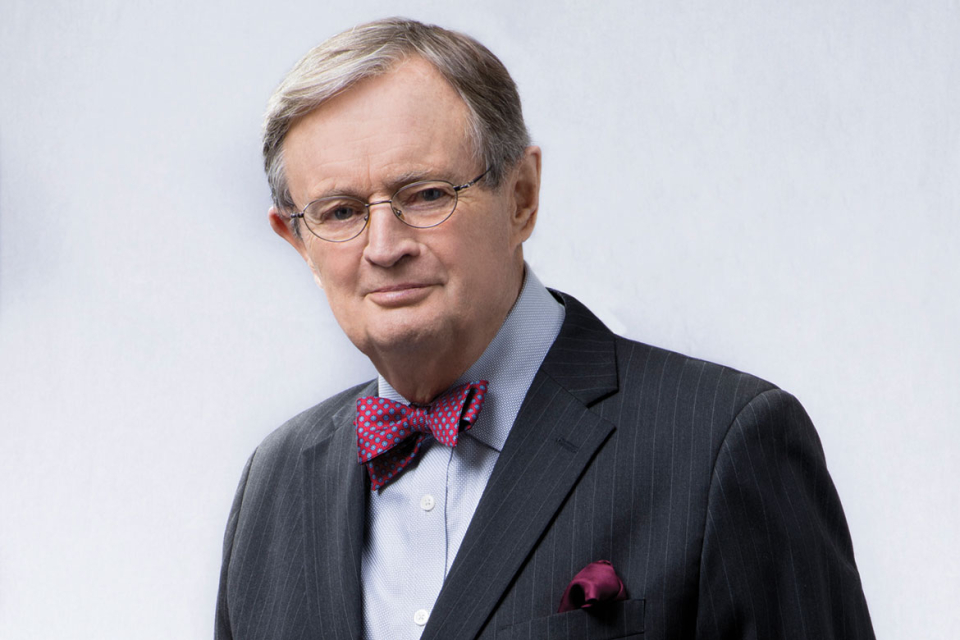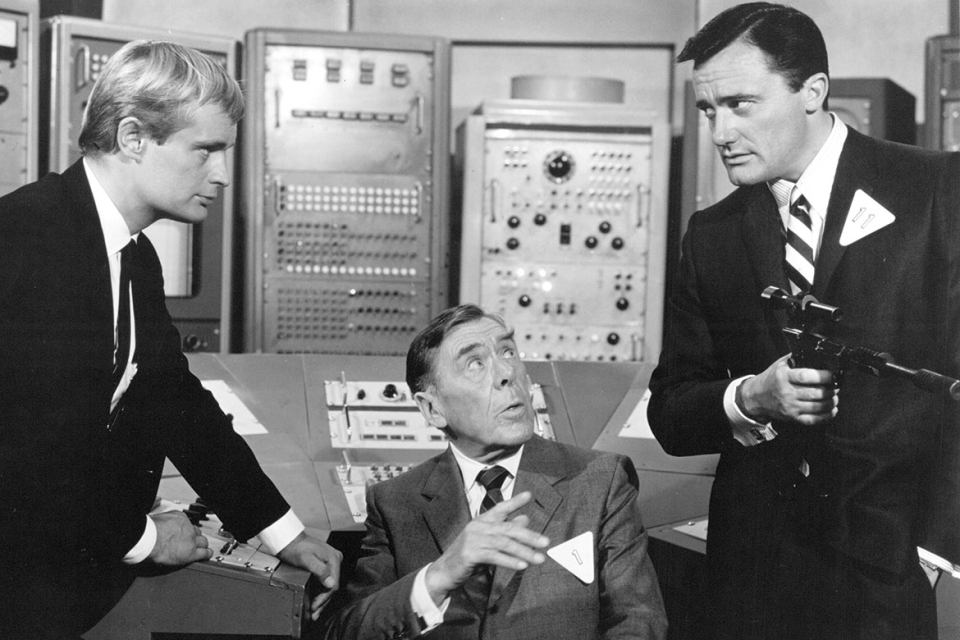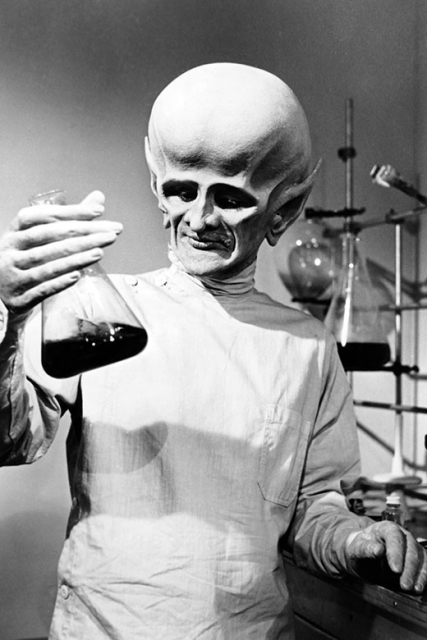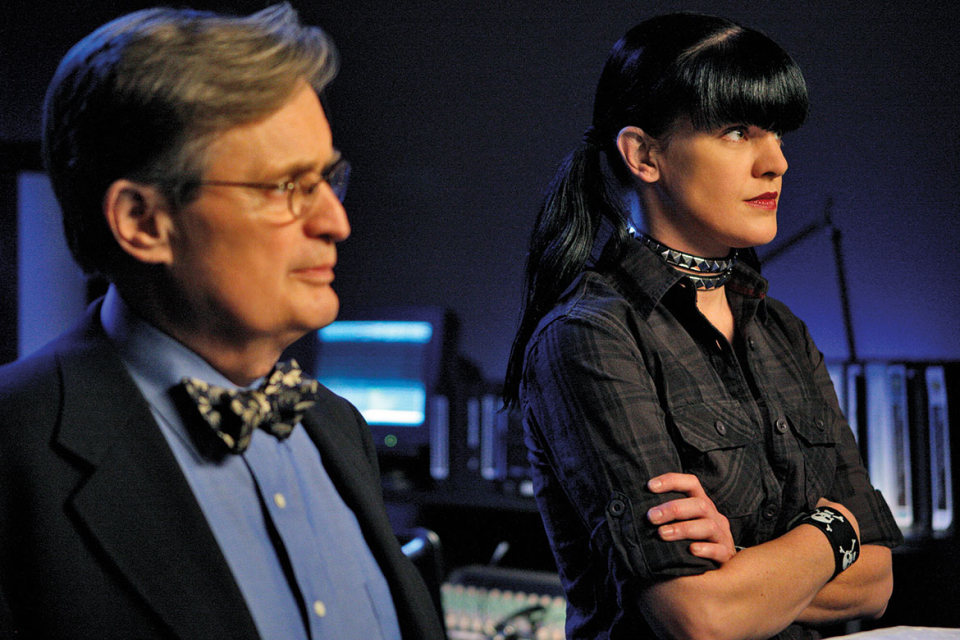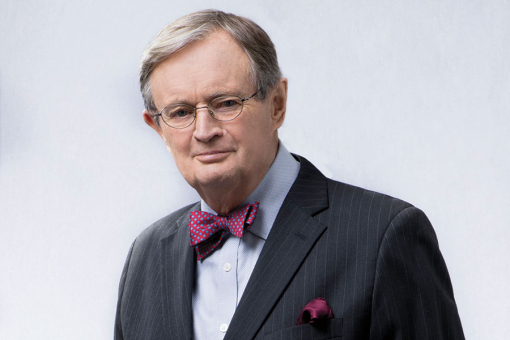In 1964, two years after the first James Bond movie splash, David McCallum made his own waves in the NBC hit The Man From U.N.C.L.E., as a bond–type gentleman spy. McCallum played a Russian, Illya Kuryakin, working for a multi-national secret intelligence agency in tandem with Robert Vaughn as American agent Napoleon Solo. Together they reveled in international adventures, using cool gadgets (like a "pen communicator" — who needs a smartphone?) to get out of trouble.
The influence of the popular series lasted well beyond its four seasons. The show sparked a spinoff (The Girl From U.N.C.L.E.), a 1983 reunion telefilm and a 2015 feature film. McCallum was nominated for two Emmys for his role in the original, in 1965 and 1966.
McCallum was born in Scotland to musician parents and began his career on BBC Radio before gravitating to television. He was nominated for a third Emmy in 1969 for his performance in the Hallmark Hall of Fame production Teacher, Teacher and was a staple of science-fiction shows in the ensuing decades. He also recorded four music albums in the '60s, which featured his unique blend of instrumental compositions.
In 2003, McCallum struck career gold a second time with his role of the avuncular Donald "Ducky" Mallard on NCIS, the CBS series about U.S. Navy investigators that just wrapped its nineteenth season and has been renewed for a twentieth. In 2016, he added author to his résumé with the publication of Once a Crooked Man, a crime novel.
McCallum was interviewed in November 2021 by Adrienne Faillace, producer for The Interviews: An Oral History of Television, a program of the Television Academy Foundation. The following is an edited excerpt of their conversation. The entire interview can be screened at TelevisionAcademy.com/Interviews.
Q: Were you involved with any early television for the BBC?
A: Yes. Over the years, I did much live television, before any recording happened. I learned lots of things with the cameramen — about lenses, for example. I could grab hold of the ring around the camera — he could walk, and I could walk, and I stayed completely in frame and in focus the entire time. It was sort of like what we have now with the Steadicam, but primitive.
Q: Were you comfortable on camera right away?
A: I took to it like a duck to water. I loved it.
Q: At that point in the 1950s, were you looking to work mainly on the stage, in film or in television?
A: It's all bound up with what was happening in my life. I was commissioned into the army — I was a second lieutenant in the Royal West African Frontier Force, stationed in Accra, Ghana, which back then was the Gold Coast.
When I came out of the army, I went with an agent who got me a part in a movie. I was in Freud with Montgomery Clift; I went to the Mediterranean and did Billy Budd with Peter Ustinov. I did movie after movie. I went under contract with the Rank Organisation [the British conglomerate founded by J. Arthur Rank, which owned studios, theaters and labs].
I've done some great movies, but not many. I think there are people that work better in television than in film, and make a career out of television wisely, which I think I've done. I think predominantly I'm a television actor.
Q: How did you get cast on The Man From U.N.C.L.E.?
A: I was out of work and had bills to pay, and [my friend, actor] Charlie Bronson knew that was the case. He said, "Why don't we have lunch in the commissary at MGM and we'll see what happens?" So we went. When you're a kid from Glasgow who's watched movies growing up, and all of a sudden you're in this cathedral which is the MGM commissary, with all the pictures on the wall and people walking around who you've seen on the screen — I just was carried away.
I met Sam Rolfe [creator of The Man From U.N.C.L.E.] at that lunch, and I think a seed was planted. I was then called by my agent, who said, "You've been offered three television series. One is to play Alexander the Great. Another is to play Judas Iscariot" — I'd just played Judas in The Greatest Story Ever Told — "And the other is a thing called Solo, which is based to a certain extent on the Bond books." It wasn't called Solo in the end because there was a conflict with the Bond rights, so it became The Man From U.N.C.L.E.
Q: What do you recall about shooting the pilot?
A: Well, the part of Illya Kuryakin was five lines or so. That was it. Then the writers saw the relationship between Leo G. Carroll [who played Mr. Waverly, the chief of the organization], myself and Bob [Vaughn], and the part grew.
Q: You used some of the MGM movie sets, right?
A: Anything that was there we used, absolutely.
Q: The show became popular and so did you. What was that period like, dealing with celebrity?
A: I lost all degree of privacy. I couldn't go anywhere. The minute I walked out, people recognized me. There's a whole new way of going through life when everybody knows who you are.
Q: I read that in a few instances, security was an issue. You were supposed to make an appearance at a Macy's in New York?
A: Fans did $25,000 worth of damage in Macy's. I went there in a police car and went up to the executive floor. One of the policemen came in shaking with Chuck Painter [the show publicist], who was responsible for the event, and he said, "You can't go down there. It's bedlam."
I said, "Okay, what are we going to do?" He said, "We've got to get you out of here. Through there is an elevator. We'll take you down and out in a police car."
So I ran and got in the police car. They'd closed Times Square, but the mob was all around. The policeman drove out into the middle of the square, and the car stalled. I was sitting back there, rather like Illya Kuryakin, and I said, "Excuse me, turn the siren and the radio off — turn off all the electrical." He turned it all off, started the car and we drove off.
The whole moment was just so James Bond. I loved it. It was so crazy.
Q: Several sources state that you got more fan mail than any other male MGM star.
A: Somebody showed me a Teen Magazine recently that listed the top ten male movie and TV stars of the day: David McCallum, Elvis Presley, Sean Connery, and the bottom one was Cary Grant.
Q: You beat out the actual Bond, Sean Connery.
A: I knew Sean. We're both from Glasgow. He could play golf. I struggled.
Q: Talk a little bit about working with your castmates, Robert Vaughn and Leo G. Carroll.
A: Robert was an academic. Most of the time we were working, he was reading books. He was writing things down. He was somewhere else slightly, and he was very open to my suggesting things when we were on set.
A couple of times he said, "You're upstaging me." I said, "Yes, I'm doing it on purpose. I'm sorry you noticed." But we had a very good working relationship. We were as different as chalk and cheese in our lifestyles, and we went out to dinner, I think, once. We didn't socialize at all.
Q: And Leo?
A: Leo was wonderfully charming and witty. I remember at the end of one of the seasons, I asked, "Are you and your wife going to take a trip?" and he said, "No, no. We've reached the age where we stay home. There are too many classics left unread," which is a great line. And when my son Peter was born, he gave me a copy of the Brahms Lullaby piano music. People point out to me that when I got the part of Ducky [Dr. Donald Mallard on NCIS], I was exactly the same age that Leo was when he got the part of Mr. Waverly.
Q: It's been over fifty years since The Man From U.N.C.L.E. went off the air. What do you consider the legacy of the show?
A: It was escapism from what was, at that time, a politically difficult situation, East versus West. Some television relates to life, but everything else is entertainment, and there's nothing wrong with entertainment.
I remember once a lady in a hospital bed said that she was so happy because she could look forward to The Man From U.N.C.L.E. It made her feel better, and I thought, "That's really why we do it."
Q: When the show ended in 1968, you moved to New York....
A: Yes, I did quite a bit of theater there.
Q: The show that brought you back to L.A. was NCIS. How did you get cast as Ducky?
A: I was walking down Park Avenue when I got a call, "We'd like you to go to [casting director] Bonnie Timmermann's office and put something on tape for a show called NCIS. You're playing a character called Ducky."
I went to Bonnie's office, and I got down on the floor. She said, "Why are you on the floor? Get up!" And I said, "No, tip the camera down. I've got a dead body, and it's on the floor." So, I did the audition with the camera tilted down. Then I got a call that they wanted me to go to Los Angeles to audition for Ducky, so I had to fly out. Susan Bluestein, the casting director, was reading the other characters. I did the same thing over again, left, and then they produced a contract.
I signed it and went over to Paramount, which was just down the road, went in through those wonderful gates and did the same audition again. Then, when I was driving away, my rental car had a flat. I got a call to say I got the job. I said, "Well, then, I'm going to go get a car that works." And that was it. I'm still doing the show.
Q: Ducky is a medical examiner. Did you do any research for the role?
A: The first thing I realized is, I knew nothing about pathology. One of my close friends is Robert Mueller, who at that point was the director of the FBI. So I said to my wife, "I have to play this right — we have to go to Washington." So we went to NCIS [at Marine Corps Base Quantico] and met David Brant, the then-director, and went all around the NCIS and the FBI.
And for many years, I observed a coroner in downtown LA. People said, "Why are you watching autopsies? Doesn't it gross you out?" I said, "No, it's the most fascinating thing I've ever seen." To take a body apart and see how it works is quite extraordinary. I said, "If I'm going to do it on television, I've got to know what I'm doing."
Very often they use scissors that say, RETURN TO KITCHEN THIRD FLOOR. They don't use surgical instruments. And the sign on the wall over three autopsies: NO EATING OR DRINKING. There's a sense of humor in there. You learn all that, and you bring that to the show, and you bring it to Ducky.
Q: How would you describe Ducky?
A: Well, Don [Bellisario, creator of NCIS] insisted on that hat. He said, "He's got to wear a hat." I said, "We're shooting in two minutes." He said, "Well, get a hat." So I went up to wardrobe and I found that [stone-colored Fedora-shaped safari hat], which is still, twenty years later, Ducky's hat.
Now Ducky is retired. I decided to leave the show, and they said, "No, we'd like to make you the historian," which was very gratifying because it meant that CBS liked that I was around.
Q: Ducky had a heart attack on the beach at the end of season nine. How did you feel about that storyline?
A: I thought it was quite wonderful. I worked with Billy Webb, the cinematographer. I said, "Do you want to get wet?" He said, "Sure, what do you want to do?" I wanted to do it in the waves and have the waves turning Ducky over. Billy rolled his socks off and put the camera in a waterproof protector, and he was right in the water with me.
I talked to my cardiologist at length before I shot the scene, to make absolutely sure that what I did was exactly what would be happening during a heart attack.
Q: Tell us about Ducky's role as a mentor to Dr. Jimmy Palmer, who's played by Brian Dietzen.
A: We started out doing a lot of that, and then I said to Brian, "What I would like now is what happens very often in an academic environment — the pupil starts to teach the teacher." We told the writers, and they agreed. It's a very good on-screen relationship. And the moments when we have two bodies and we've assembled them and we find another tibia, and we say, "Oops!" those are golden moments.
Q: Do you have thoughts about how long you'd like to continue with the show?
A: There's some logistics involved. I live in the East now, so I fly to California, I drive to my motorhome, and three weeks later, I reverse the process and come back. But if they want me to do it, I'll do it, and hopefully I'll be fit enough to do it.
Q: Do you have any advice you would like to offer an aspiring actor?
A: No matter what they tell you, do it — if you fail, you fail.
If you want a mundane, silly answer: get yourself a degree in business, because you can get yourself a job. Ninety-eight percent of actors are unemployed in this country. And even when you get a wonderful job, it ends.
People don't understand that half the time actors are battling to find work and make ends meet. People should know that going in, not once it happens.
Q: Have you thought of how you would like to be remembered?
A: It's in the eye of the beholder, the listener or the observer — but with affection.
To see the entire interview, go to: TelevisionAcademy.com/Interviews.
This article originally appeared in emmy magazine issue #7, 2022.

